CBS Television Distribution
For 35 years, Alex Trebek has been the purveyor of obscure facts from the archeologist who opened King Tut’s tomb in 1922 (Who is Howard Carter?) to the device Alexander Graham Bell tested out on Civil War vets still riddled with bullets (What is a metal detector?).
But yesterday the longtime Jeopardy! host educated his followers on something infinitely more important and far more personal.
“Just like 50,000 other people in the United States each year, this week I was diagnosed with stage 4 pancreatic cancer,” he shared in a video message that has been viewed by upwards of three million people since it was posted to YouTube Wednesday afternoon. “Now normally the prognosis for this is not very encouraging, but I’m going to fight this, and I’m going to keep working.”
His admission, that he made “in keeping with my longtime policy of being open and transparent with our Jeopardy! fan base,” was crushing. And not just because it’s hard to hear that anyone has been diagnosed with a disease as terrifying as cancer, particularly a form with discouraging odds that has already claimed such beloved Hollywood icons as Patrick Swayze, Alan Rickman and Aretha Franklin.
For the past three-plus decades, the 78-year-old native of Ontario, Canada has just been reliably there for us, turning up on our TV set each weeknight to teach us about literature, state capitals and world leaders in his soothing, authoritative voice. And while some stars might begrudge being pigeonholed so completely for the bulk of their career, the former Canadian Broadcasting Corporation newsreader seems to relish his roles as America’s teacher.
“You have to set your ego aside,” he reasoned to Vulture in November about the secret to his longevity. “The stars of the show are the contestants and the game itself. That’s why I’ve always insisted that I be introduced as the host and not the star. And if you want to be a good host, you have to figure a way to get the contestants to—as in the old television commercial about the military—’be all you can be.’ Because if they do well, the show does well. And if the show does well, by association I do well.”
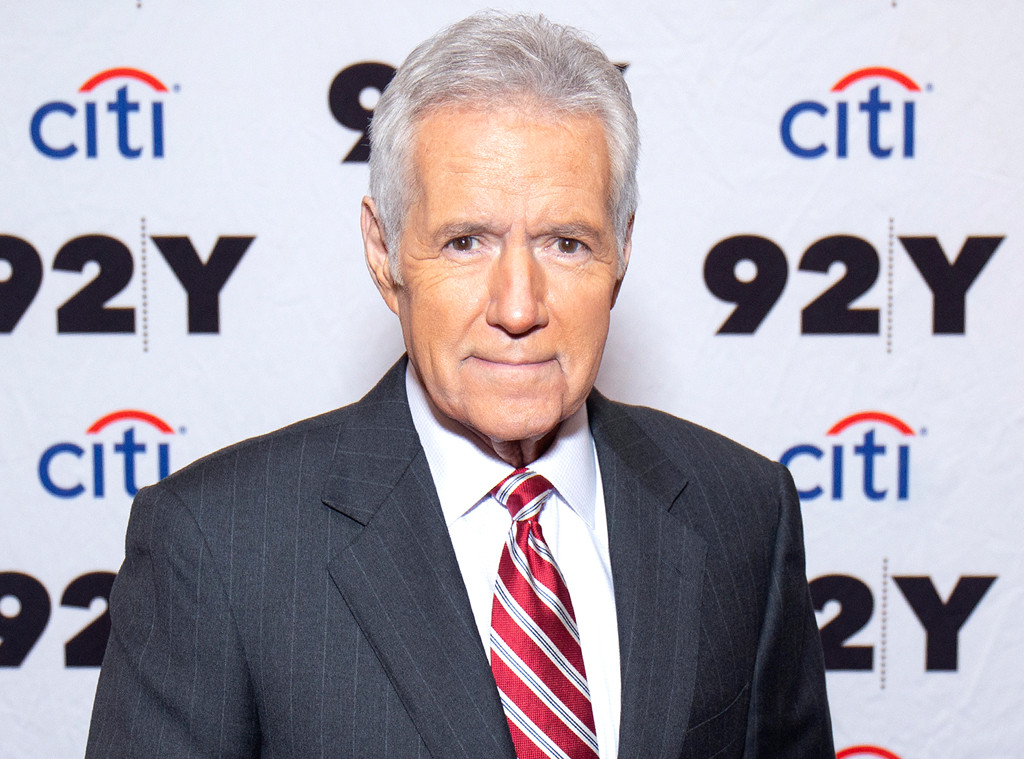
Santiago Felipe/Getty Images
In many ways, he’s succeeded far beyond any dream he may have harbored as a philosophy major at the University of Ottawa.
That’s when the bilingual star (he speaks both French and English) got his start at the CBC, doing announcing work while still completing his studies. “I went to school in the mornings and worked at nights,” he explained to the network in 1964. “I did everything, at one time replacing every announcer in every possible job.”
By then, he’d earned a gig hosting a CBC-TV teen dance show called Music Hop, followed by Reach for the Top, a high school quiz show, and Strategy. In 1973, with a decade of hosting under his belt and considerable notoriety in his home country, he made the move to California.
Though he landed a role heading up The Wizard of of Odds, a game show with challenges revolving around statistical questions, he felt ill at ease in his new city. “I was a shy, small-town Canadian kid,” he explained to Vulture. “A friend of mine, Alan Hamel, who is married to Suzanne Somers, had come to California before I did, and I always thought, He fits right into this society. I never felt like I belonged.”
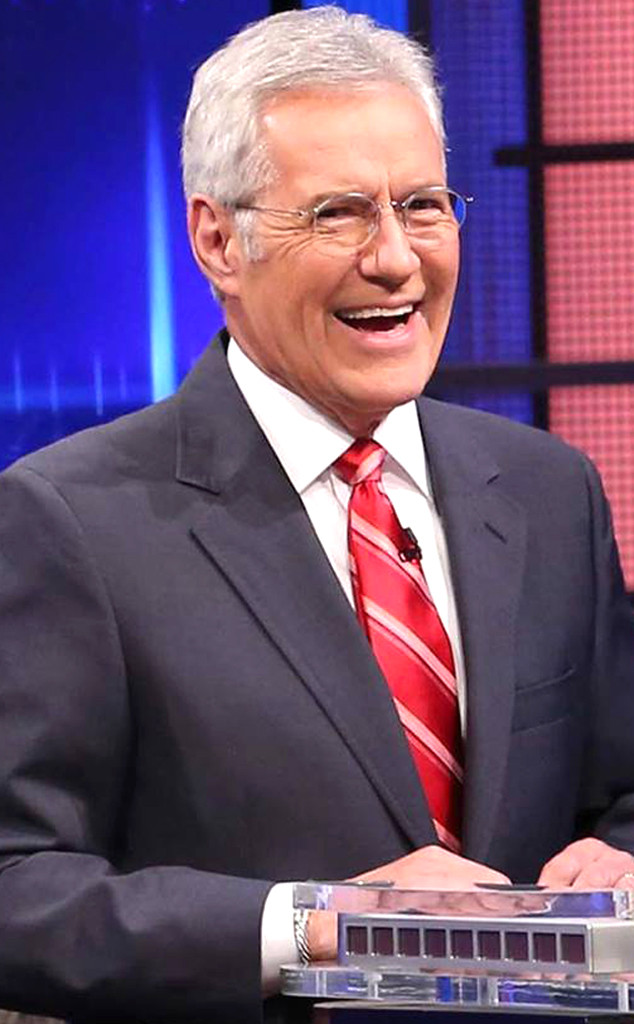
As he began collecting TV jobs, The Wizard of Odds was followed by High Rollers, Battlestars and Classic Concentration, he found a mentor in publicist Richard Gully. “We met, and because he threw a lot of dinner parties at the Bistro, an ‘in’ restaurant in Beverly Hills at the time, he often needed single guys to fill out the table,” he explained. “So Richard would invite me, and his being there to introduce me to people made me comfortable. And Burt Sugarman, who produced the very first show that I hosted here, The Wizard of Odds, introduced me to the backgammon-playing community. I met people that way; I didn’t have to go out on my own.”
And once he landed his career-making job on the Jeopardy! revival (the original, daytime version premiered on NBC in 1964), he learned people were eager to meet him. “I would play in celebrity golf tournaments and meet stars,” he shared. “Frank Sinatra told me he was a fan of the show. Jimmy Stewart, too. I thought, Oh my gosh. These major stars watch me on occasion. I felt good about that.”
Not that he bought too much into his own notoriety. A self-described homebody, he didn’t really love the L.A. nightlife, preferring quiet nights at home reading James Comey‘s A Higher Loyalty, Amy Siskind‘s The List or The Brontës by Juliet Barker. “I was never into going out to clubs,” he told People. “It wasn’t my scene.”
And he gets how admissions like that play into the nerdy professor image most fans have of him and, frankly, he’s fine with it.
“I’ve learned that people draw conclusions that satisfy their prejudices, and those conclusions don’t always coincide with reality,” he noted to Vulture. “People think because I’m the host of a fairly serious, intelligence-based quiz show that I must know all the answers. I do—because they’re written on a sheet of paper in front of me. And audiences are always surprised when they discover that I like to fix things around the house, that I’m not a nerdy person who spends all his time researching information that might come in handy on Jeopardy!. But I don’t mind surprising people in that way.”
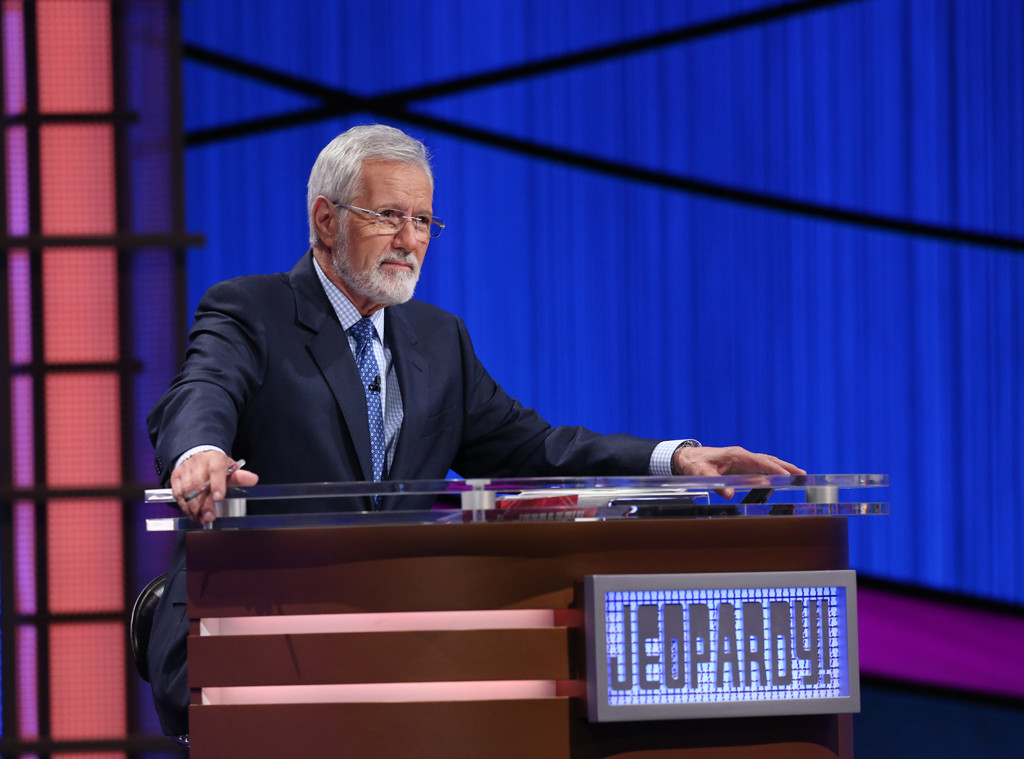
Jeopardy Productions, Inc.
Another little-known aspect to his personality: He’s a bit of a romantic. Following a brief marriage to businesswoman Elaine Callei that ended in 1981, he spent years tooling around the Bistro (“I was not a player,” he insisted. “I dated not that often,”) before meeting a real estate project manager from New York named Jean Currivan.
A smitten Trebek says his only regret about their nearly-three decade marriage, which has produced 29-year-old New York City restauranteur Matthew (he owns Harlem eatery Oso) and 27-year-old Emily, who works in real estate in L.A., is that it didn’t begin sooner. “I was thinking about President Bush when he died, and all the comments about his life about what a nice guy he is, and how he and his wife had been together 73 years,” he told People in his January interview. “I thought, oh my gosh…if I’d just met Jean in my 20s we could have had a longer life together.”
Of course, he jokes wryly of his 54-year-old bride, “I guess if I’d met her when I was in my 20s she wouldn’t have been born yet. But hey, 29 years is pretty good!”
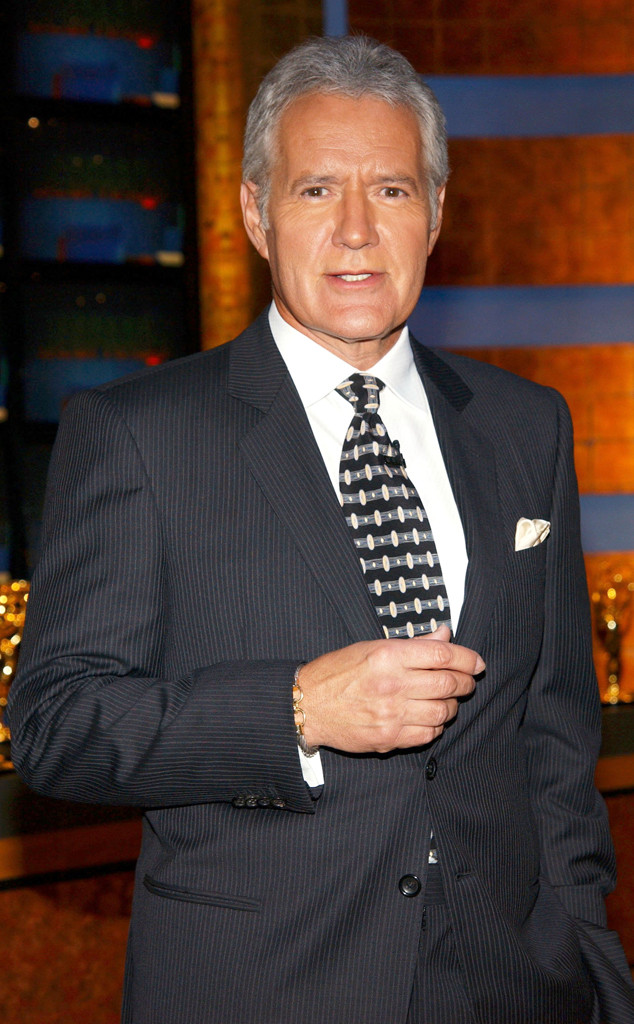
Picture Perfect/Shutterstock
Friends first, she told People, “There was just this deep sensitivity about him with a gruffy exterior. I kept thinking, he’s 24 years older than me…but there was something that just kept drawing me to him.”
Now she realizes it was his great sense of humor coupled with intelligence and just the right amount of humility. “He takes his job very seriously,” she told the mag, “but won’t take himself too seriously.”
While he’s quick to downplay his importance as the man at the helm of the beloved program, he maintains a deep appreciation for the game. He gets annoyed when people bet too little on Daily Doubles. “I have been disappointed when contestants made conservative wagers because they don’t realize the obvious. And that is, if a clue is in the second box from the top, it’s going to be easier than a clue at the bottom of the category.” And that ever-so-condescending tone when contestants miss on an obvious question? It’s 100 percent authentic.
“Yes, it’s conscious,” he told Vulture. “Not that it’s preplanned—it’s a reaction—but I know that ‘You’ve disappointed daddy’ is a tone I’m striking. It’s also, ‘How can you not get this? This is not rocket science.'”
Across his decades in the public eye, Trebek has weathered few scandals, save for some complaints about seemingly sexist remarks (“I’ve been criticized for treating women more harshly than men. I’ve also been criticized for treating women better than men. In fact, I remember looking in a stack of letters once and finding two: One said, ‘Boy, you fawn over women [contestants] and try to help them out.’ And the other was, ‘Boy, you’re mean to women,'”) and the time he moderated a Pennsylvania gubernatorial debate only to be taken to task for talking too much.
As such he was recently checked in at number eight on Reader’s Digest‘s list of the most trusted people in America and encountered an unexpected uproar when he floated the idea of a potential retirement during a July 2018 chat with Harvey Levin for OBJECTified, fans unable to imagine anyone else reminding contestants to phrase their answers in the form of a question. At the time, he’d undergone a December 2017 to remove blood clots from his brain and survived two mild heart attacks.
“I got a lot of publicity when I mentioned that,” he admitted, having since renewed his contract through 2022, “but, pardon me, I look at the show and think, I’m pretty good. So either our director is saving my ass through judicious editing or I’m not as bad as I sometimes think I am.”
Plus, he still really loves what he does. “I have to work, but it’s work I enjoy and that still has challenges,” he said. “I have at least two new players on each program and all new material that I’ve got to read properly.”
Despite his recent diagnosis, he has no intentions of walking away. “I plan to beat the low survival rate statistics of this disease,” he stressed in his video message. “Truth told, I have to. Because under the terms of my contract I have to host Jeopardy! three more years!”
But should he feel it’s time to call it quits, he intends to cede control willingly. “All you need is a competent host to help keep things moving,” he told Vulture, noting that the perfect person would be “personable, bright, have a sense of humor. My recommendation is Betty White.” (Others he has floated include CNN’s Laura Coates and Los Angeles Kings announcer Alex Faust.)
His only request, he said, is to go out on his own terms.
“I will tell the director, ‘Time the show so that I have 30 seconds at the end.’ Because when Ken Jennings lost after 74 wins in a row, I had a tear in my eye and no time for a good-bye. So all I want on my last show is 30 seconds, and I’ll do what Johnny Carson did: ‘Hey, folks, thank you. Been a good run and all good things must come to an end.’ Then I’ll move on.”

